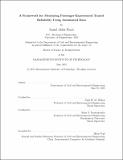A framework for measuring passenger-experienced transit reliability using automated data
Author(s)
Wood, Daniel Alden
DownloadFull printable version (4.182Mb)
Other Contributors
Massachusetts Institute of Technology. Department of Civil and Environmental Engineering.
Advisor
Nigel H. M. Wilson and Haris N. Koutsopoulos.
Terms of use
Metadata
Show full item recordAbstract
A public transport operator's ability to understand and improve service reliability experienced by passengers depends upon their ability to measure it. Traditionally, largely due to data collection limitations, passengers' experience of reliability has not been measured directly. As a result, operators often fail to effectively measure, and thus manage, key issue affecting passengers' perceived reliability. However, with the relatively recent availability of automatic data collection (ADC) systems, it has become technically feasible to measure passengers' reliability experience at a detailed level. If used in practice, passenger-experienced reliability measurement has the potential to improve public transport systems' responsiveness to passengers needs across many functional areas. This thesis develops a framework for the understanding and practical use of passenger-experienced reliability measurement on high-frequency transit systems. A model of passenger-experienced reliability based on total travel time variability is developed, and the key differences from "operational" reliability identified. This model is applied to identify public transport management functions which should be targeted as a result of passenger-experienced reliability measurement. The model and potential applications are then synthesized to develop a set of design criteria for passenger-experienced reliability metrics. Two new measures of passenger-experienced reliability are developed, both aiming to quantify the "buffer time" passengers must add to compensate for travel time variability. The first measure, derived from passengers' actual travel times from automatic fare collection (AFC) data, is essentially the median travel time variability experienced by frequent travelers over each origin-destination (OD) pair of interest. The second measure, derived from vehicle location data, OD matrices, and train load estimates, is based on a simulation of passengers' waiting, boarding, transfer, and in-vehicle travel process. This second metric is aimed at "non-gated" systems without exit AFC data, for which passengers' travel times cannot be measured directly. These two metrics are tested and evaluated using data from the Hong Kong MTR system. These metrics' response to incidents, scheduled headways, and passenger demand are tested at the OD pair and line levels. The results are used to evaluate these metrics according to the previously-developed design criteria for passenger-experienced reliability metrics. The first metric is found to be suitable for implementation (where adequate data is available), while the second is found to inadequately measure demand-related delays. An implementation guide for the AFC-based metric is developed. This guide is structured around four main implementation decisions: (1) coordination with an operator's existing metrics, (2) defining the service scope, (3) determining an appropriate frequency of calculation, and (4) defining appropriate time of day intervals and date periods. This guide is then demonstrated using a case study application from MTR: an investigation of the 2014 Hong Kong political demonstrations' impact on MTR reliability.
Description
Thesis: S.M. in Transportation, Massachusetts Institute of Technology, Department of Civil and Environmental Engineering, 2015. This electronic version was submitted by the student author. The certified thesis is available in the Institute Archives and Special Collections. Cataloged from student-submitted PDF version of thesis. Includes bibliographical references (pages 173-175).
Date issued
2015Department
Massachusetts Institute of Technology. Department of Civil and Environmental EngineeringPublisher
Massachusetts Institute of Technology
Keywords
Civil and Environmental Engineering.